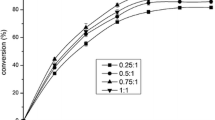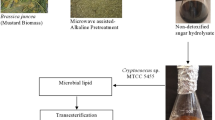Abstract
Using whole cell as a catalyst of enzymatic transesterification is a method to produce biodiesel with fewer drawbacks and at a lower cost. In the present study, biodiesel was produced by the reaction of waste frying oil with methanol in the presence of Rhizopus oryzae PTCC 5174 in both immobilized and free forms. Effect of four influencing factors including temperature, methanol to oil molar ratio, amount of biomass, and shaking speed was investigated. Response surface methodology was used to find the optimum conditions of the transesterification reaction. Each factor was set at three levels and the yield of the biodiesel was considered as the response. A quadratic equation was well-fitted with the experimental data. The optimum condition in immobilized and free forms was: 1 g microorganism for both forms, temperature of 44 and 45 °C, 5:1 and 4.7:1 methanol to oil molar ratio, and 150 and 160 rpm shaking speed, respectively.



Similar content being viewed by others
References
Demirbas, A.: Biodiesel production from vegetable oils via catalytic and non-catalytic supercritical methanol transesterification methods. Prog. Energy Combust. Sci. 31, 466–487 (2005)
Mu, Y., Xiu, Z., Zhang, D.: A combined bioprocess of biodiesel production by lipase with microbial production of 1,3-propanediol by Klebsiella pneumonia. Biochem. Eng. 40, 537–541 (2008)
Nie, K., Xie, F., Wang, F., Tan, T.: Lipase catalyzed methanolysis to produce biodiesel: optimization of the biodiesel production. Mol. Catal. B: Enzym. 43, 142–147 (2006)
Pazouki, M., Zamani, F., Zamzamian, A.H., Fahar, M., Najafpour, G.H.: Esterification of free fatty acids by Rhizopus oryzae as cell-catalyzed from used cooking oil for biodiesel production. World Appl. Sci. 8, 719–724 (2010)
Li, W., Du, W., Liu, D.: Optimization of whole cell-catalyzed methanolysis of soybean oil for biodiesel production using response surface methodology. Mol. Catal. B: Enzym. 45, 122–127 (2007)
Li, Q., Yan, Y.: Production of biodiesel catalyzed by immobilized Pseudomonas cepacia lipase from Sapiumsebiferum oil in micro-aqueous phase. Appl. Energy 87, 3148–3154 (2010)
Lim, S., Teong, L.: Recent trends, opportunities and challenges of biodiesel in Malaysia: an overview. Renew. Sustain. Energy Rev. 14, 938–954 (2010)
Koda, R., Numata, T., Hama, S.H., Tamalampudi, S., Nakashima, K., Tanaka, T., Ogino, C.H., Fukuda, H., Kondo, A.: Ethanolysis of rapeseed oil to produce biodiesel fuel catalyzed by Fusarium heterosporum lipase-expressing fungus immobilized whole-cell biocatalysts. Mol. Catal. B: Enzym. 66, 101–104 (2010)
Tan, T., Lu, J., Nie, K., Deng, L., Wang, F.: Biodiesel production with immobilized lipase: a review. Biotechnol. Adv. 28, 628–634 (2010)
Hama, S.H., Yamaji, H., Fukumizu, T., Numata, T., Tamalampudi, S., Kondo, A., Noda, H., Fukuda, H.: Biodiesel-fuel production in a packed-bed reactor using lipase-producing Rhizopus oryzaecells immobilized within biomass support particles. Biochem. Eng. 34, 273–278 (2007)
Salum, T.H.F.C.H., Villeneuve, P., Barea, B., Yamamoto, C.I., Côccoc, L.C., Mitchell, D.A., Krieger, N.: Synthesis of biodiesel in column fixed-bed bioreactor using the fermented solid produced by Burkholderia cepacia LTEB11. Process Biochem. 45, 1348–1354 (2010)
Bana, K., Hama, S.H., Nishizuka, K., Kaieda, M., Matsumoto, T., Kondo, A., Nodad, H., Fukuda, H.: Repeated use of whole-cell biocatalysts immobilized within biomass support particles for biodiesel fuel production. Mol. Catal. B: Enzym. 17, 157–165 (2002)
Li, W., Du, W., Liu, D., Yao, Y.: Study on factors influencing stability of whole cell during biodiesel production in solvent-free and tert-butanol system. Biochem. Eng. 41, 111–115 (2008)
Zeng, J., Du, W., Liu, X., Liu, D., Dai, L.: Study on the effect of cultivation parameters and pretreatment on Rhizopus oryzae cell-catalyzed transesterification of vegetable oils for biodiesel production. Mol. Catal. B: Enzym. 43, 15–18 (2006)
Sun, T., Du, W., Liu, D., Dai, L.: Improved catalytic performance of GA cross-linking treated Rhizopus oryzae IFO4697 whole cell for biodiesel production. Process Biochem. 45, 1192–1195 (2010)
Fukuda, H., Kond, A., Noda, H.: Biodiesel fuel production by transesterification of oils: a review. Biosci Bioeng. 92, 405–416 (2001)
Qin, H., Yan, X., Yun, T., Dong, W.: Biodiesel production catalyzed by whole-cell lipase from Rhizopus chinensis. Catal. Chin. 29, 41–46 (2008)
Antczak, M., Kubiak, A., Antczak, T., Bielecki, S.: Enzymatic biodiesel synthesis—key factors affecting efficiency of the process: a review. Renew Energy 34, 1185–1194 (2009)
Tamalampudi, S., Talukder, M.R., Hama, S.H., Numata, T., Kondo, A., Fukuda, H.: Enzymatic production of biodiesel from Jatropha oil: a comparative study of immobilized-whole cell and commercial lipases as a biocatalyst. Biochem. Eng. 39, 185–189 (2008)
Jin, G., Bierma, T.J.: Whole-Cell Biocatalysts for Producing Biodiesel from Waste Greases. Illinoise Sustainable Technology Center, United State (2010)
Bradley, N.: The Response Surface Methodology. Master thesis, Indiana University South Bend, India (2007)
Montgomery, D.C.: Design and Analysis of Experiments, Chapter 11: Response Surface Methods and Other Approaches to Process Optimization, p 429, 5th edn. Wiley (1997)
Pazouki, M., Zamani, F., Zamzamian, S.A.H., Najafpour, G.H.: Study on reaction conditions in whole cell biocatalyst methanolysis of pretreated used cooking oil. World Renew. Energy Congr. Swed. 93–100 (2011)
Mahapatra, P., Kumari, A., Garlapati, V.K., Banerjee, R., Nag, A.: Enzymatic synthesis of fruit flavor esters by immobilized lipase from Rhizopus oligosporus optimized with response surface methodology. Mol. Catal. B: Enzym. 60, 57–63 (2009)
Reese ET, Robbins FM.: Denaturation of β-lactoglobulin by shaking and its subsequent renaturation. Colloid Interface Sci. 83, 393–400 (1981)
Acknowledgments
Authors would like to thank the research office of Sharif University of Technology for its financial support.
Author information
Authors and Affiliations
Corresponding author
Rights and permissions
About this article
Cite this article
Ghaderinezhad, F., Kariminia, HR. & Yaghmaei, S. Production of Biodiesel from Waste Frying Oil Using Whole Cell Biocatalysts: Optimization of Effective Factors. Waste Biomass Valor 5, 947–954 (2014). https://doi.org/10.1007/s12649-014-9314-7
Received:
Accepted:
Published:
Issue Date:
DOI: https://doi.org/10.1007/s12649-014-9314-7




